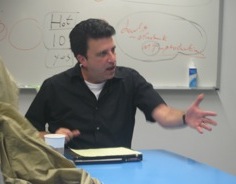How to Make It as a Screenwriter—Part 2: Are You a Real Writer?

One of the best things about being invited into the Film Independent family through our artist development programs is having the chance to learn from the cream of the crop. Some of the most successful directors, producers and screenwriters in the business come into our offices to talk with the Fellows in our Labs about what it’s really like out there. They share the stories of their own ups, downs—and way, way downs—in the business, as well as offering advice on everything from how to win over your crew on set to how to cure writers’ block. One of our favorite guest speakers is Corey Mandell, a writing teacher and award-winning playwright and screenwriter. Mandell has been a workshop leader and advisor for Project Involve and the Screenwriting Lab. We asked Mandell to contribute to this blog by sharing his articles on screenwriting, and started last week with part 1: Breaking In. Here’s part 2: Are You a Real Writer?
I’ve recently had some agents and managers come to my UCLA classes to speak about how the industry has changed since the last writers’ strike, and one thing I heard really hit me. One manager said that real writers are still able to survive but that the pretend writers are now completely out of luck.
I asked her what the difference was between real writers and pretend writers.
She said pretend writers fall into different camps. Some of them are the imitators. They see Juno and try to write like Diablo Cody. Or they see The Hurt Locker or The Hangover and try to write movies like that. They are trying to replicate someone else’s success. Another camp includes those who try to chase what’s hot. They write what they think the industry is buying right now. They don’t write from their passion. They don’t write what they most want to write. They write what they think they can sell and it shows. She also said pretend writers follow the popular story paradigms and formulas. They crank out predictable, homogenous scripts.
She said that before the writers’ strike, the best of the pretend writers could cobble together a career, perhaps even a fairly lucrative one. But not any more.
It’s now virtually impossible to sell anything without a major star or director attached, which is why the agents and managers who visited my class all said they’re looking to sign writers who can write material that can attract these elements. And what are the stars and directors looking for? Something different. Something fresh and original. Something that isn’t like all the same old formulaic crap coming out of the studio development process.
The agents said that stars want to play characters that nobody has ever seen before—characters with unique voices. And that is what real writers create.
Real writers don’t care what anyone else thinks. They don’t write scripts to chase the hot trends. They write what they want to (or have to) write. And they don’t fit it into the popular story paradigms and formulas. They write it their way, in their voice. Which means that their scripts are unlike anyone else’s scripts.
That’s the key.
The agents and managers all said they want the next Diablo Cody. Because only Diablo Cody can write a Diablo Cody script. The same is true with Mark Boals. Or Alan Ball. Or Quentin Tarantino. Or any real writer.
Real writers are brand names.
They aren’t manufacturing characters and stories that follow the same old tired formulas and trends. They are creating truly original characters and worlds. Which is the only way to get the attention of a star or director.
Of course this doesn’t mean that all great original material will get made. Most of it won’t. But it will get the writer noticed and it will get them meetings, which could lead to writing gigs and perhaps a career.
One agent put it this way: When you are established and have a career, you need to know how to write the studio formula script, but you can’t break into the business that way. You have to break in with an amazingly well-written piece of work that is unlike anything we’ve seen before. That’s the only way to get noticed.
So if you want to give yourself the best possible shot you have to ignore all the so-called experts and formula peddlers trying to sell you information on what you should write and how you should write it.
You need to become a real writer.
Write what you most want to write, following your own unique passion and voice.
Create characters and stories that only you could have invented.
Write scripts that don’t read like everybody else’s scripts.
Because in this current marketplace, the multitude of pretend writers are sitting around complaining about how impossible it is to have a career—while the real writers are doing just that.

Corey Mandell / Screenwriter & Guest Blogger
Corey Mandell is an award-winning playwright and screenwriter who has written projects for Ridley Scott, Wolfgang Petersen, Harrison Ford, John Travolta, Warner Brothers, Universal, 20th Century Fox, Fox 2000, Fox Family, Working Title, Paramount, Live Planet, Beacon Films, Touchstone, Trilogy, Radiant and Walt Disney Pictures. Corey teaches screenwriting at UCLA and offers private online classes using real time video conferencing.
